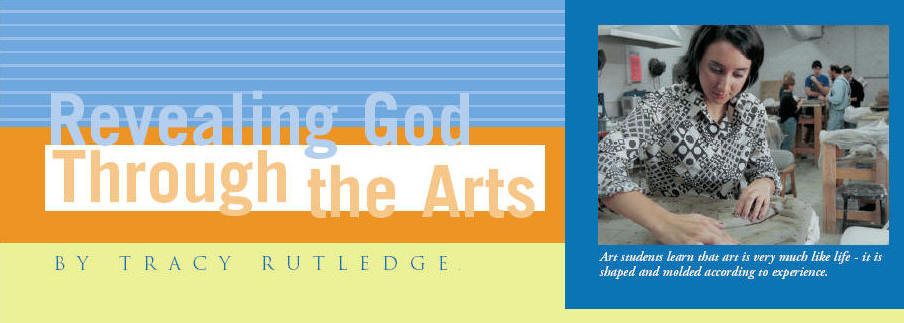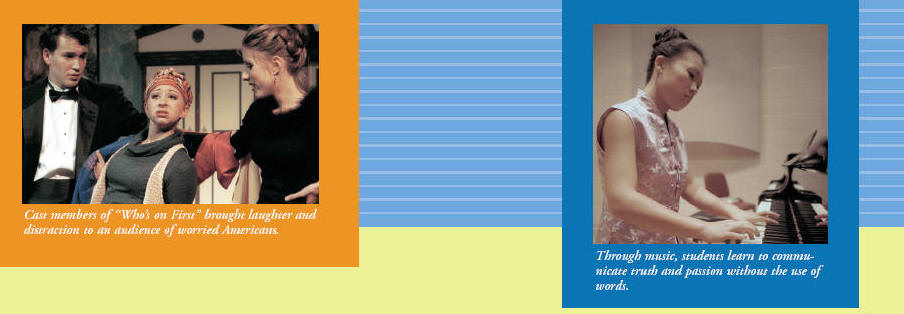

| When history points to the first images of art, one might
think of the world’s first artists as those who did the early prehistoric
cave drawings and paintings, or the statues of fertility goddesses simply
formed from earthen materials. When Lee Benson, associate professor of art
and a specialist in ceramic sculpture, thinks of the first artist, he
thinks of God.
“If you look to what Christians adhere to as the beginning, the Bible says that God created, He made things, including man,” explains Benson, adding that God’s creation has a distinct parallel with the art of sculpture. “When I teach students about developing the human form, they fall in love with it. It’s not that they loved it beforehand, but the act of creating develops a love for the sculpture.” That act of creating, says Benson, is what gives us insight into God’s love. “With creative intensity comes a love for that which is being created. You can just naturally talk about God and how He approaches the creative process.” It is that creative process that drives all artists, whether through sculpture, theatre, or music. “A great novel, a compelling performance, an intriguing sculpture, and a stirring musical piece all have the common ability to entertain and to inspire,” says Dr. Barbara McMillin, dean of the College of Arts and Sciences. “This two-fold purpose satisfies our desire for pleasure while at the same time giving us reason to ponder and reflect, often resulting in a better understanding of our own circumstances.” Art, because of its very nature, reflects society and tends to be prophetic, says David Burke, director of theatre and associate professor of communication arts at Union. “It’s grappling with passion and emotions, the heartbeat of a culture and reflecting back to us. In that sense there is something of great value for society,” explains Burke. “Music is the most subtle of all the arts,” believes David McClune, professor of music. “These organized sounds have a profound power on our hearts and mind. It transcends earthly life and can provide a glimpse of the timelessness and utter beauty that exists in the spiritual world of God.” It is that emotional quality of art – whether through fine art, theater, music or literature – that communicates even through times of great tragedy. During World War II, Winston Churchill made it a priority during the bombing of London to keep the theaters open. “He felt it was important in the face of Nazism to keep the theaters open because it revealed what English society was about and gave hope,” explains Burke. He says that Union experienced a similar occurrence after the events of Sept. 11, when the communication arts department was preparing to open “Who’s on First”, a slap-stick comedy with a cast of four. “We booked the play in the spring not knowing what would happen on September 11,” says Burke, who directed the play. “And so on the day of the attacks, we found ourselves rehearsing a frivolous comedy in the midst of all this horror and pain and we wondered why we were even there. We spent a lot of time in prayer before we began.” One of the things Burke says that he and the students realized was that the show had to go on. “The theater has always been a distraction from day-to-day life. But when that day-to-day life involves something horrific, it compels you even more toward finding distraction,” says Burke, “especially if it can be helpful and edifying for the moment.” |

In This World and Not of ItUnion University’s mission is to provide a Christ-centered education. Equipping students to think and act Christianly in the world is a challenge not taken lightly by the faculty. “I think we take the responsibility of helping students realize what their gifts are much more seriously than anything else we do,” says Burke, in addition to understanding the responsibility for using their talents and answering the call that God has placed on their lives. “The talents you have are direct gifts from God. What you do with your gifts is up to you.” Even in Hollywood, says Burke, most artists recognize that their gifts come from outside themselves. “They may not be thanking God in the same way we do because of our understanding of God, but they recognize that other dimension. Our students are made aware of their responsibility to the kingdom of God and are encouraged to pursue art in a way that gives back and is redeeming. Although something might not be overtly evangelical, it can still be a reflection of God,” asserts Burke. Christians are called to take the light of Christ into the world. The fields of art, theater, music and literature open doors to an audience often searching for answers. “We are sending graduates into the workplace equipped with the knowledge and skills to be leaders in their chosen disciplines,” explains McMillin. “When such leaders hold a Christian worldview, they influence their profession in positive ways for the cause of Christ and are respected by their colleagues in the workplace. Having earned such respect, these graduates can more effectively share their faith as they fulfill their calling.” “I want to see my students in the great secular magazines and books of our day,” says Benson. “I talk to my students about the fact that when I open Art America, I do not see a Christian artist there. Ultimately, it will be their work that will get them a place at the table. God is preparing young people to go into the secular art world and have a large impact.” David Burke agrees. “There are ultimately places our students can have a huge impact. We are trying to put as many theater graduates in the public schools as possible, because we know they are going to have an impact on high school students. You can bring in redemption through theater in a way that you can’t in a regular classroom. If they watch a play that causes them to ask questions, then you have an opportunity to answer.” “There is a bias against Christians. There is not a bias against good work,” explains Benson. “I tell my students that the minute you are identified as a Christian you will face persecution. We shouldn’t run from that. People are not biased against great work, which is why it is so important that our students learn their art and learn it well while they’re here.” “It is within a Christian university that the totality of human thinking and experience can be addressed,” says McClune. “We have the freedom to openly discuss the many varied Christian and secular views of any subject. We have the obligation to share what we know, what we think we know, and truthfully acknowledge when we do not know. We are here to train Christian minds to continue the honest search for new knowledge and a deeper understanding of both God and His creation.” |